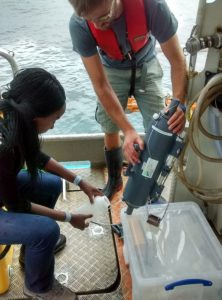Dr Margaret Kadiri is a Teaching Fellow in the Geography Department at King’s College London. Her research tackles one of the main challenges facing the tidal renewable energy sector which is the lack of understanding of the hydro-environmental impacts associated with tidal renewable energy schemes. Tides are a highly attractive source of renewable energy. The regularity of tides reduces uncertainty over power generation while also reducing carbon emissions and increasing energy security. In the UK, tidal energy presents substantial opportunities for large scale clean energy generation and there has been an increased interest in the generation of electricity from tidal energy sources in recent years, with plans for a tidal lagoon scheme in Wales, the first in the world. Alongside plans for the development of such schemes comes the need to understand their potential impacts on the hydro-environment as this has impeded the growth of the UK’s tidal energy sector. Margaret’s work aims to address some of the hydro-environmental concerns, and to find mitigating measures to minimise the impacts, particularly the risk of eutrophication by nutrient enrichment. Ultimately, this will help in designing schemes which can maximise power output with the least environmental impacts. To this end, Margaret recently returned from a field expedition of the potential site for the proposed tidal lagoon in Swansea Bay in collaboration with colleagues from Swansea University and Imperial College London.


In addition to providing baseline conditions, the water quality data collected during the field expedition will be used to assess the robustness of a novel coastal ocean model which is been developed at Imperial College London (http://thetisproject.org/). The aim is for the model to be employed as a reliable tool for water quality impact assessment of prospective tidal renewable energy schemes and to develop a functionality to accurately assess the risk of eutrophication.